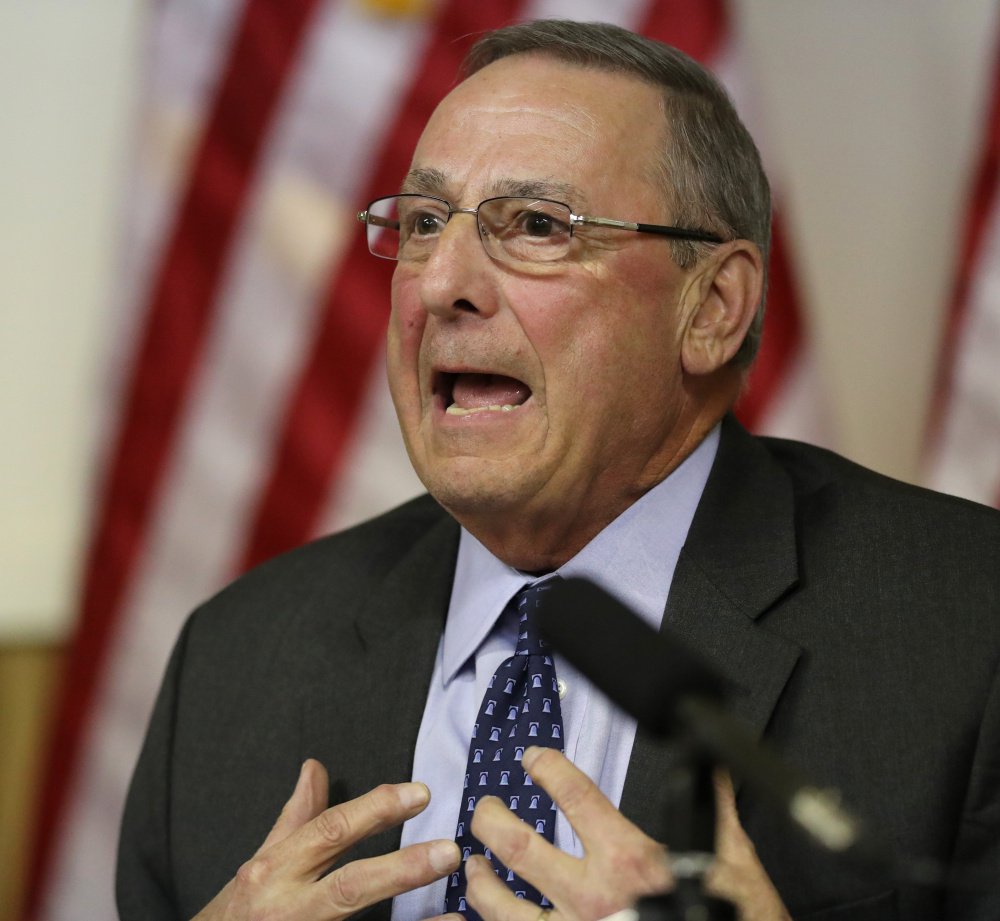Gov. Paul LePage defended his administration’s funding of opioid addiction services Tuesday, dismissing concerns about access to treatment for addicts who don’t have health insurance and blaming Democrats for resisting his efforts to increase treatment capacity.
Talking about the state’s devastating drug addiction crisis, LePage brushed off a question during a phone-in radio interview on WVOM in Bangor about addicts who cannot get access to treatment because they lack health insurance and land on long waiting lists for subsidized care at clinics that provide methadone and counseling.
“How do people without health insurance get those services?” asked co-host Amanda Cost, who is facilities director for Spruce Run-Womancare Alliance, an anti-domestic violence organization in Penobscot and Piscataquis counties.
“They just go to the methadone clinic that has a clinical aspect, and it’s free,” LePage answered.
Cost responded that it’s not that easy. “The services aren’t there for the need that exists,” she said.
“Oh, so you are saying we have to put more money into it,” said LePage, who previously had noted that the state spends $80 million annually to provide access to treatment. “When is it enough money to solve this problem? If somebody could tell me that, then we’ll have that debate.”
Maine overdose deaths climbed for the fifth straight year in 2016, soaring nearly 40 percent to claim a record 378 people and signal a deepening of the state’s drug crisis.
Opioid drugs, especially fentanyl and heroin, caused most of the deaths, according to figures released by the state Attorney General’s Office in January. The 378 fatalities surpassed the previous record of 272 set in 2015.
The LePage administration has cut methadone reimbursement rates, leading to the closure of at least one clinic. And the governor repeatedly has fought expanding access to Narcan, which revives people who overdose. Those seeking treatment for illicit drugs but unable to access it in Maine number about 25,000 to 30,000, according to estimates from SAMHSA, the federal substance abuse treatment agency.
LePage said he had tried for six years to build a 200-bed treatment facility at the Maine Correctional Center in Windham, and that Democrats only approved the prison’s expansion last year because it was an election year. LePage has said the treatment beds at the Windham prison could be used in collaboration with the state’s county jails, many of which are housing inmates who have addiction problems.
“The Democrats for years fought me,” he said. “And now they turn around and say, ‘It’s the governor.’ ”
Maine Senate Minority Leader Troy Jackson, D-Allagash, said he has met with LePage several times on the drug crisis this year and LePage has never mentioned county jails.
“To say Democrats aren’t open to any and all serious ideas to fight the drug crisis alongside the law enforcement community is a lie, plain and simple,” Jackson said.
The facility for treating drug offenders is part of a larger expansion plan that had been debated in the Legislature before getting approved last year. Democrats, meanwhile, have complained that LePage was slow to support expansion of addiction treatment services and was focused more on strengthening law enforcement to crack down on traffickers. More recently, LePage and Democrats have agreed to direct $4.8 million in state and federal funds toward expanded addiction treatment.
Jackson also detailed several bills passed into law in 2016 that were sponsored or supported by Democrats.
“Last year, Democrats supported, and passed, a Law Enforcement Assisted Diversion program sponsored by Sen. Mark Dion, which empowers county sheriffs and other law enforcement agencies to funnel low-level offenders into treatment,” Jackson said. “It was a serious plan that earned the support of both parties.” Dion, D-Portland, a lawyer and former Cumberland County sheriff, has served four terms in the Maine House.
“Half-baked ideas and chatter from the governor are not the same thing as legitimate legislation,” Jackson said. “Our drug crisis is growing because of a lack of opportunity, a lack of hope and a lack of health care and treatment. The governor could be working to address those deficits. Instead, he’s spending his time hobnobbing in Washington and throwing partisan bombs on talk radio.”
Scott Thistle can be contacted at 791-6330 or at:
sthistle@pressherald.com
Twitter: thisdog
Send questions/comments to the editors.




